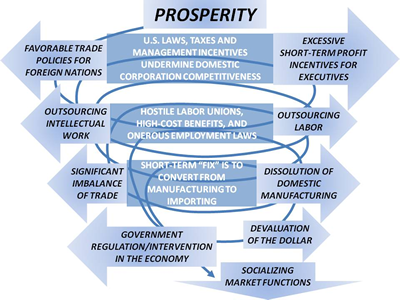A Structural Change To Our Economy
SEARCH BLOG: ECONOMY
Bill and I talk on the phone occasionally. He contacted me a few years ago and, although I have not had the chance to meet him personally, have gotten quite comfortable with our conversations. He has had experience dealing with Federal and state governments and has many contacts among those who have insight into the present problems of our nation.
It had been a few months since our last conversation, so I sent him an email which contained this bit:
I've watched with interest as the market floats around 9.5 to 10K and wonder what is keeping it afloat. Lots of talk about a slowing rate of job losses, but cumulatively they have been huge and the consumer segment is pretty quiet... especially up here. Housing remains stagnant except for foreclosures. The auto industry is hanging on by a thread. States are in deep shit. The dollar is dung. Obama wants to punish energy producers, job producers, health care providers, and our military allies.Shortly thereafter, I received a call from Bill and we talked for nearly three hours... and I never talk anywhere near that long with anyone. We rambled through a myriad of economic issues from trade and taxation to housing and health care. We agonized over U.S. involvement in the Middle East because we both felt there was no real strategy... but we had somewhat different ideas about what should be done. I'm more of a "fight the war and then worry about nation building and using our military as policemen" having never understood why the U.S. would enter a war and then take a self-limiting/self-defeating approach.
So when does the market hit 14K again? Are we out of the woods yet?
Unlike earlier conversations, we didn't end up feeling any sense of resolution. Bill was fairly adamant that the economy was in for a fundamental change because our trade policies over the past two decades has undermined our production sectors and we have tried to fool ourselves into thinking we can be prosperous as a giant service economy. Jobs are gone; jobs are going. We will not have sufficient new jobs to replace those lost plus those needed for a growing population.
Yesterday Bill sent this:
I can't argue with Bill's reasoning. Below is a graphic I have posted several times and continue to keep in the right hand column of this blog. At the top center is my point to Bill that it all begins with laws/trade agreements and the tax code that incentivize the destruction of our domestic production sectors. Bill's point was we need to start with the trade policy [that is either behind the laws and tax codes or a result of it... I'm not certain which is the chicken and which is the egg].Bruce,
Let's cut to the chase. The consumption share of U.S. GDP no longer will be 71% of GDP and may fall back to levels in the 67% range. The change in U.S. consumption will have major impacts domestically and internationally.
Focusing more specifically on the U.S. economy, it's clear that changes in U.S. consumer consumption patterns will impact a multitude of domestic economic considerations including available taxation revenues from sales of goods and services to employment levels.
We will hear all sorts of ideas and chatter to counteract the reduced spending levels of consumers, but none are likely to have any major impact on returning consumer purchases to previous levels. And we're going to hear all sorts of employment ideas including incentives for creating job growth in businesses. So, we'll spend money pursuing some of those ideas, but very little will change on the consumption front.
This is where we are and where we are headed unless there is a major positive change in the structure of the U.S. economy. Don't expect that to happen any more than we should expect major changes in U.S. trade policy.
What will fill the U.S. GDP loss due to reduced consumption? This is the question which deserves serious attention. It could easily represent a 4% hit.
Bill
Click on the image for more on this subject. By the way, I think we are nearing or at the bottom of the chart. And I guess the answers to my questions to Bill are: "not for a long time" and "no." Apparently, there is a difference between Ben Bernanke declaring that the recession is over and, well, the recession being over.
..









